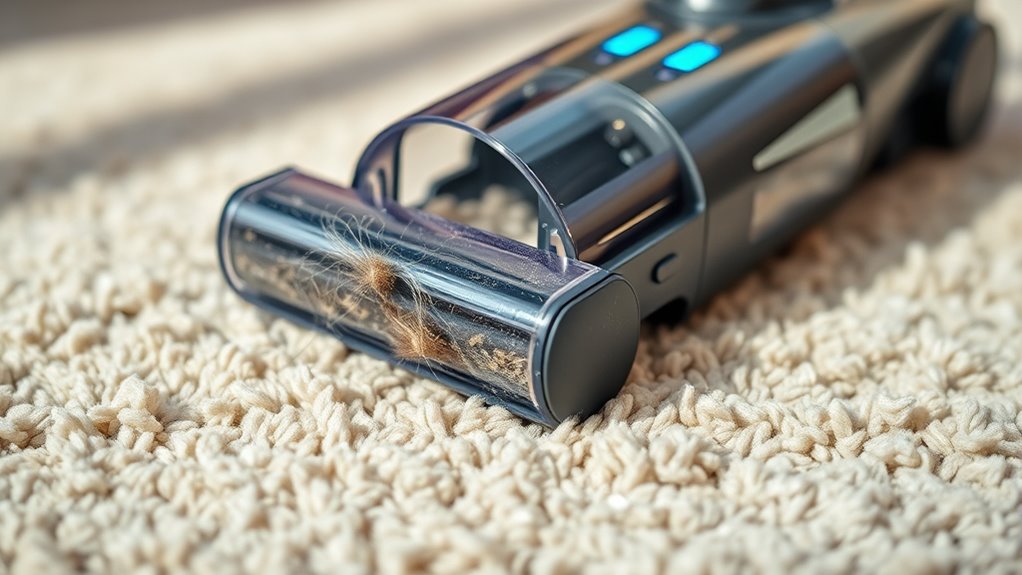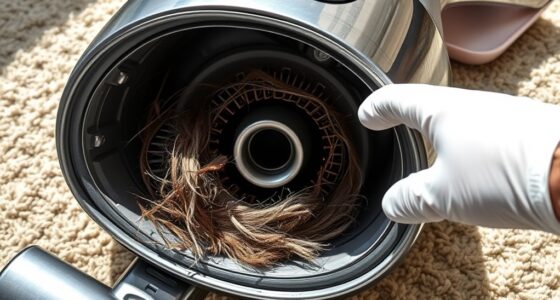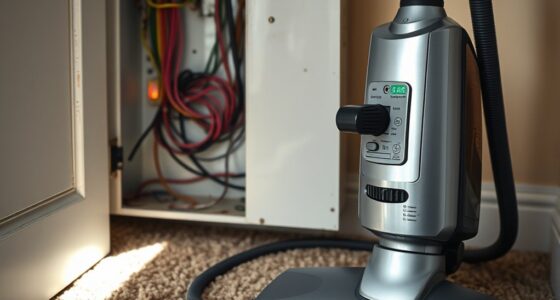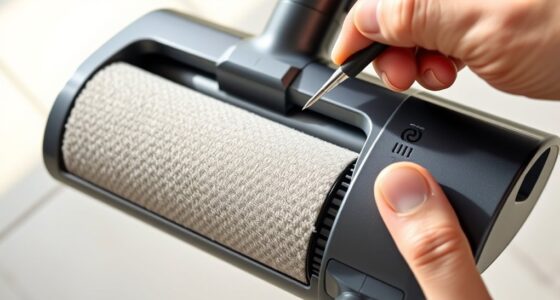A bad vacuum smell often comes from dirty filters, clogged bags or canisters, or tangled hair and debris that rot or grow mold over time. To fix this quickly, clean or replace your filters, empty the dustbin or bag, and inspect for hair or debris in the brush roll. Regular maintenance helps prevent odors from building up. Keep going to discover more tips to keep your vacuum smelling fresh and working better.
Key Takeaways
- Dirty filters and clogged air pathways trap dust, pet dander, and debris, causing foul odors.
- Accumulated debris or hair tangled in the brush roll can rot and emit bad smells.
- Moisture buildup in filters, bags, or canisters promotes mold and bacteria growth, leading to odors.
- Regularly cleaning or replacing filters prevents odor-causing bacteria and mold.
- Emptying the vacuum bag or canister frequently and adding baking soda absorbs and neutralizes smells.
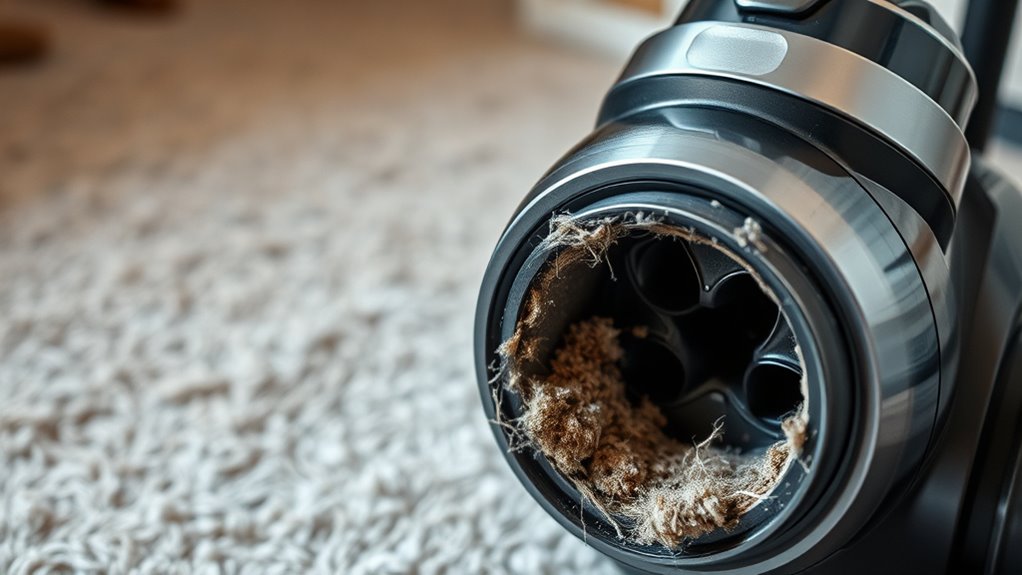
A lingering vacuum smell can be surprisingly stubborn, but luckily, there are simple fixes you can try to eliminate it. One of the most common culprits is a dirty or clogged filter. Regular filter maintenance is essential—not just for your vacuum’s performance but also for preventing bad odors. Over time, filters trap dust, dirt, and pet dander, which can start to smell if not replaced or cleaned regularly. Check your vacuum’s user manual to see how often you should clean or swap out the filter. Many models allow you to wash the filter, but ensure it’s completely dry before reinstalling. If your filter is past its prime, replacing it with a fresh one can make a big difference, immediately reducing unpleasant smells and improving your vacuum’s airflow.
Regular filter maintenance prevents odors and keeps your vacuum working efficiently.
Another key to tackling odor is understanding odor absorption. Vacuum bags or canisters can fill with debris and moisture, creating a breeding ground for bacteria and mold that emit foul smells. If you notice your vacuum smells bad even after cleaning, it’s time to empty the bag or canister. When you do, consider adding odor-absorbing materials, like baking soda, inside the bag or canister to neutralize smells. You can also sprinkle some baking soda in the vacuum’s filters or on the floor before vacuuming to absorb odors as you go. Additionally, some vacuums come with built-in odor filters or charcoal filters, which are specifically designed to trap and neutralize smells. If yours doesn’t have this feature, you might want to retrofit it with an odor-absorbing filter or use aftermarket options to improve odor control.
Beyond filters and bags, it’s worth inspecting the vacuum’s brush roll and attachments. Hair, pet fur, and debris can get tangled and start to rot if left unchecked, contributing to bad smells. Regularly cleaning these parts prevents odor buildup and keeps your vacuum functioning at its best. Also, a thorough cleaning of the vacuum’s interior, including the hose and dustbin, can eliminate hidden sources of bad smell. Using a mixture of mild detergent and water, wipe down these parts and allow them to dry completely before reassembling. Additionally, understanding the role of AI in data analytics can help in developing smarter detection of odor sources through sensor integration.
In essence, maintaining your vacuum’s filters and managing odor absorption are the quickest routes to banishing unpleasant smells. Consistent filter maintenance, combined with strategic odor absorption techniques, stops bad odors before they take hold. With these simple steps, you’ll keep your vacuum smelling fresh and working efficiently, making your cleaning routine more pleasant and effective.
Frequently Asked Questions
Can a Full Bag Cause My Vacuum to Smell?
Yes, a full vacuum bag can cause your vacuum to smell. When the vacuum bag gets full, odor buildup occurs because dust and debris sit longer, releasing bad smells. A clogged or overflowing bag traps odors, which then circulate during use. To fix this, you should replace the vacuum bag regularly and clean filters to prevent odor buildup and keep your vacuum smelling fresh.
How Often Should I Replace Vacuum Filters?
Did you know that regular filter maintenance can improve your vacuum’s efficiency by up to 50%? You should replace your vacuum filters every 3 to 6 months, depending on usage and manufacturer recommendations. A proper replacement schedule guarantees cleaner air and better suction. Keep track of your filter’s condition, and don’t wait too long—neglecting it can lead to odors and decreased performance. Stay consistent for a fresher, more effective clean.
Does Using Scented Vacuum Bags Help With Odors?
Using scented vacuum bags can help with odors by adding a pleasant scent and providing some odor absorption benefits. The scented bag benefits include masking bad smells and freshening your space. However, for better odor absorption techniques, consider regularly cleaning your vacuum and changing filters. Scented bags are a quick fix, but combining them with proper maintenance guarantees your vacuum stays fresh and odor-free longer.
Can Pet Hair Buildup Cause Bad Smells?
Pet hair buildup can definitely cause bad smells in your vacuum. As it accumulates, pet hair absorbs odors from your home, trapping unpleasant smells inside. Over time, this buildup releases odors each time you vacuum, making the smell worse. To fix this, empty your vacuum regularly, clean or replace filters, and remove pet hair from the brush roll. Keeping your vacuum clean helps prevent odor absorption and keeps your home smelling fresh.
Are There Natural Remedies to Eliminate Vacuum Odors?
Imagine your vacuum’s smell drifting like a cloud of unwanted perfume. You can fight this naturally by adding a few drops of essential oils, like lavender or eucalyptus, to your vacuum bag or filter. Baking soda is also a hero — sprinkle it inside to absorb odors. These simple remedies freshen your vacuum without harsh chemicals, leaving your home smelling clean and inviting every time you vacuum.
Conclusion
So, next time your vacuum smells off, try these quick fixes—you might be surprised how simple solutions can do the trick. Some say that a smelly vacuum is just a sign of hidden mold or bacteria lurking inside, but that’s not always the case. Often, it’s just trapped debris or a forgotten filter. Don’t let the odor linger—give these tips a shot and enjoy a fresher, cleaner home with minimal effort!
